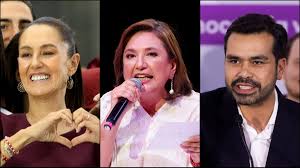Landmark Election
On June 2, Mexicans will participate in a historic presidential race that could see a woman ascend to the presidency for the first time. This significant election will not only decide the next president but also fill over 20,000 positions, including 128 senate seats, 500 deputy seats, the mayorship of Mexico City, and governorships in several states.
The Leading Presidential Candidates
Claudia Sheinbaum
Claudia Sheinbaum, a prominent candidate, has garnered widespread support with her comprehensive policy proposals. She aims to:
- Continue the Pension Program for Senior Citizens: Ensuring financial security for the elderly population.
- Offer Scholarships for Millions of Students: Promoting education and equal opportunities.
- Provide Free Fertilizers to Small Farmers: Supporting agricultural productivity and sustainability.
- Improve Security: Implementing reforms and better coordination among law enforcement agencies.
Xóchitl Gálvez
Xóchitl Gálvez, supported by an opposition coalition, has made significant strides despite being relatively new to the political scene. Her key focuses include:
- Strengthening Welfare Programs: Enhancing social safety nets to support vulnerable populations.
- Enhancing Local and State Police: Improving public safety through better training and resources.
- Investing in Renewable Energy: Committing to environmental sustainability and reducing reliance on fossil fuels.
Jorge Álvarez Máynez
Jorge Álvarez Máynez, another notable candidate, emphasizes progressive and inclusive policies. His platform includes:
- Economic Reforms: Promoting economic growth and reducing inequality.
- Healthcare Improvements: Ensuring access to quality healthcare for all citizens.
- Educational Initiatives: Fostering innovation and improving educational standards.
A Historic Milestone for Women in Politics
Breaking the Glass Ceiling
This election represents a pivotal moment for gender equality in Mexican politics. With two leading female candidates, Claudia Sheinbaum and Xóchitl Gálvez, the possibility of a woman becoming president has never been more imminent. This shift signifies a broader acceptance and recognition of women’s leadership capabilities.
Detailed Policy Proposals
Sheinbaum’s Vision for Mexico
Pension Program for Senior Citizens
Sheinbaum’s commitment to continuing the pension program for senior citizens is a cornerstone of her campaign. This initiative ensures that the elderly population receives consistent financial support, enhancing their quality of life.
Educational Scholarships
Sheinbaum plans to offer scholarships to millions of students, aiming to make education accessible and equitable. This proposal addresses systemic barriers to education and promotes long-term socio-economic development.
Agricultural Support
By providing free fertilizers to small farmers, Sheinbaum seeks to boost agricultural productivity and sustainability. This initiative supports rural communities and contributes to food security.
Security Reforms
Sheinbaum’s approach to improving security involves comprehensive reforms and enhanced coordination among law enforcement agencies. This strategy aims to address crime and ensure public safety.
Gálvez’s Progressive Agenda
Welfare Programs
Gálvez’s focus on strengthening welfare programs highlights her commitment to social justice. By expanding social safety nets, she aims to support marginalized communities and reduce inequality.
Police Enhancement
Gálvez advocates for the enhancement of local and state police forces through improved training and resources. This proposal aims to create safer communities and foster trust between law enforcement and the public.
Renewable Energy Investments
Gálvez’s dedication to investing in renewable energy reflects her commitment to environmental sustainability. By reducing reliance on fossil fuels, she aims to address climate change and promote green technologies.
Challenges and Opportunities
Economic and Social Reforms
The next president will face significant challenges in implementing economic and social reforms. Addressing inequality, improving public services, and fostering economic growth will require innovative policies and strong leadership.
Environmental Sustainability
Promoting environmental sustainability is a critical priority for Mexico’s future. The candidates’ commitments to renewable energy and sustainable practices highlight the importance of addressing climate change and preserving natural resources.
Public Engagement and Support
Grassroots Movements
Grassroots movements and community engagement play a vital role in shaping political campaigns. The candidates’ ability to connect with voters and address their concerns will be crucial in garnering support.
Media and Communication
Effective communication through media platforms is essential for candidates to convey their messages and engage with the public. Leveraging social media, television, and print media will be key strategies in their campaigns.
The Path Forward
Inclusive Leadership
The election presents an opportunity for inclusive leadership that represents diverse perspectives and addresses the needs of all citizens. The candidates’ policies and approaches reflect their commitment to creating a more equitable society.
Building a Sustainable Future
Investing in renewable energy, promoting social welfare, and enhancing public safety are critical steps towards building a sustainable future. The next president’s vision and policies will shape Mexico’s trajectory in the coming years.
The June 2 election marks a historic milestone for Mexico, with the potential for a woman to become president for the first time. Claudia Sheinbaum and Xóchitl Gálvez lead the charge with their progressive agendas, aiming to strengthen social welfare, enhance public safety, and invest in renewable energy. As Mexicans cast their votes, the promise of inclusive leadership and a sustainable future offers hope and inspiration for generations to come.




